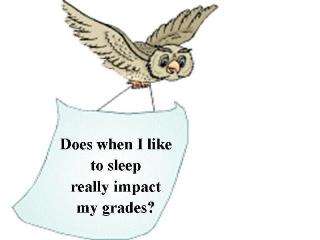Welcome to the Hendrix College Sleep Lab

Research:
What do we do?
The main focus of the research in my lab involves the investigation of sleepiness and its impact on our lives. Sleepiness is really the process of sleep turning on! So when you feel sleepy, you know the brain mechanisms involved in sleep are becoming more active and those involved in keeping you awake are becoming less active.
We have been examining the relationship of sleepiness to a wide variety of other things: hunger, burnout (severe stress responses), social cognitions (such as blaming others when things go badly for you), moral decisions, academic performance, mating choices, and the way we process information. Students are involved in all aspects of the laboratory from planning studies, collecting data, analyzing data and writing that up for publication and presentation.
Here's Charity Simpson (one of my research students) from Data collection to Presentation (well, Nick, another research student, is pretending to be a participant)
Why do we study sleepiness?
Of course, sleep itself is very important. It's a behavior we spend (hopefully) 1/3 of our lives doing and the quality and quantity of our night sleep impacts many many of our daytime waking behaviors. But why study sleepiness? This transition from wakefulness to sleep is very important. If you have ever heard someone complain about sleep, they are most certainly complaining that they either can't go to sleep when they want, or they are falling asleep when they don't want! The more we know about this transition period and the impact that this transition can have on our lives, then the more control we can have over this process.
Current Projects:
The Relationship of Sleepiness to Eating and Hunger
The objectives of the project are to determine if increasing sleep time in college students can decrease food consumption and in the long run, help combat growing obesity rates. Research shows that hormones related to eating change when we are sleepy and these changes may be related to excess caloric intake.
The Relationship of Sleepiness to Burnout
(2).jpg)
The objective of the project is to determine if sleepiness may make one more vulnerable to a severe stress response known as burnout. We have investigated this in college students and ministers and are preparing to look at airplane pilots.
The Relationship of Sleepiness to Social Cognitions
In this line of research we are looking at how sleepiness may influence the way you think. Negative things happen to us all, and how you think about those negative things later can influence your behavior in the future. For instance, if something bad happens and you think later..."that really stunk, but if I try harder in the future, I can keep that from happening again"; it's likely that if you find yourself in that situation again, you'll try harder! BUT, if something bad happens and you think later..."that really stunk, and it was all Mary's fault that it went down like that"; it's likely that if you find yourself in that situation again, you'll be less likely to do things differently because you don't see your own behavior as the problem. Along with collaborators from the University of Arkansas at Little Rock, we are examining if sleepiness influences the likelihood of evaluating situations in particular ways. We recently presented this work at a conference. Here's a link to a website about it.
- The Relationship of Sleepiness to Academic Performance

The objective of the project is to determine if certain types of people have more or less difficulty adjusting to college life. A number of years ago, I started a longitudinal study tracking some of the students in our incoming freshman class at Hendrix. I followed them from high school throughout their college careers and found that students that we would consider "owls" (they like to go to bed late and sleep late) had a greater drop in their GPA from high school to college than students that are considered "larks" (they like to go to bed early and get up early) or "regular robins". We recently presented this work at a conference. Here's a link to a website about it.
We presented this research at the end of the students' Sophomore year as preliminary findings and then the entire 5 year study at the end of their Senior year. You can see a TIME Magazine online article or a copy of the TIME Magazine print article that came out in 2009 about the first 2 years of the study.
- The Relationship of Sleepiness to Information Processing
In my main line of research, my research students and I are looking at cognitive processing during sleep onset. The ability to process and respond to information in the external environment doesn’t end when we go to sleep. We know this anecdotally because we don’t fall out of our beds at night, our alarms wake us and mothers wake to their babies’ cry. What does happen is that our ability to attend and respond to environmental stimuli changes as we get sleepy. Exactly how this changes and what we’re still capable of doing when we are sleepy is not well understood. We investigate these changes in cognitive processing by looking at electrical brain activity in response to stimuli as people fall asleep that may help us better understand the effect that drowsiness has on behavioral and cognitive performance.
